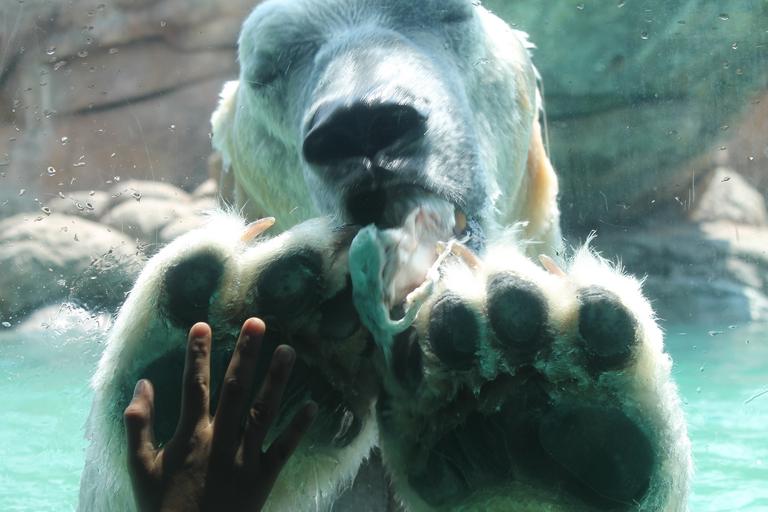MAKE A MEME
View Large Image

| View Original: | Polar_Bear_Feeding.jpg (4272x2848) | |||
| Download: | Original | Medium | Small | Thumb |
| Courtesy of: | www.flickr.com | More Like This | ||
| Keywords: polar bear nature ecology bio366 uncw ursus maritimus human june 2016 north carolina zoo #uncweteal uncweteal su2016 image3 outside arctic ice global warming asheboro zoological zoology mammal marine predator keystone nc outdoor This weekend I visited the North Carolina Zoo in Asheboro, North Carolina. I saw so many fascinating organisms there, but this Polar Bear (Ursus Maritimus) during his feeding time was one of the most striking. Polar Bears are apex predators as well as a keystone species in their Arctic habitats. Predominately carnivores, Polar Bears love to eat harbor seals. However, they will scavenge when their primary prey is in shortage. Human influence and global warming has greatly impacted the Polar Bear populations. In their Arctic habitats, Polar Bears live on ice and will swim to travel and to find food. As the ice melts more rapidly due to climate change, Polar Bears have increased chances of dying trying to hunt their food with not as many areas to land for a rest in between swims. Also, Poaching has negatively effected Polar Bear populations. Sadly, the Polar Bear is considered a "vulnerable" species with scientists predicting a very grim future for the future populations of Polar Bears. Source: www.pbs.org/wnet/nature/bears-of-the-last-frontier-polar-... This weekend I visited the North Carolina Zoo in Asheboro, North Carolina. I saw so many fascinating organisms there, but this Polar Bear (Ursus Maritimus) during his feeding time was one of the most striking. Polar Bears are apex predators as well as a keystone species in their Arctic habitats. Predominately carnivores, Polar Bears love to eat harbor seals. However, they will scavenge when their primary prey is in shortage. Human influence and global warming has greatly impacted the Polar Bear populations. In their Arctic habitats, Polar Bears live on ice and will swim to travel and to find food. As the ice melts more rapidly due to climate change, Polar Bears have increased chances of dying trying to hunt their food with not as many areas to land for a rest in between swims. Also, Poaching has negatively effected Polar Bear populations. Sadly, the Polar Bear is considered a "vulnerable" species with scientists predicting a very grim future for the future populations of Polar Bears. Source: www.pbs.org/wnet/nature/bears-of-the-last-frontier-polar-... | ||||